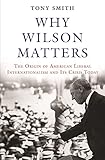Why Wilson Matters : The Origin of American Liberal Internationalism and Its Crisis Today / Tony Smith.
Material type: TextSeries: Princeton Studies in International History and Politics ; 152Publisher: Princeton, NJ : Princeton University Press, [2017]Copyright date: ©2017Description: 1 online resource (352 p.) : 1 line illusContent type:
TextSeries: Princeton Studies in International History and Politics ; 152Publisher: Princeton, NJ : Princeton University Press, [2017]Copyright date: ©2017Description: 1 online resource (352 p.) : 1 line illusContent type: - 9780691171678
- 9781400883400
- International relations
- POLITICAL SCIENCE / International Relations / General
- American democracy
- American exceptionalism
- American foreign policy
- American liberal internationalism
- American national security
- Bretton Woods system
- Bush Doctrine
- European Union
- Germany
- Iraq Resolution
- Japan
- League of Nations
- Marshall Plan
- Mexican Revolution
- NSS-2002
- North Atlantic Treaty Organization
- Obama presidency
- Panama Canal
- Philippines
- Wilsonian tradition
- Wilsonianism
- Woodrow Wilson
- collective security
- democracy promotion
- democracy
- democratic government
- democratic institutions
- democratic life
- democratic order
- democratic peace theory
- democratic people
- democratic society
- democratic transition theory
- democratic world
- freedom
- hegemony
- human rights
- international system
- invasion of Iraq
- just war doctrine
- liberal internationalism
- liberal internationalist community
- liberal internationalist tradition
- militant foreign policy
- multilateralism
- national security
- neo-Wilsonianism
- political responsibility
- progressive imperialism
- protection
- self-governing peoples
- world affairs
- world peace
- 327.73 23
- JZ1469
- online - DeGruyter
- Issued also in print.
| Item type | Current library | Call number | URL | Status | Notes | Barcode | |
|---|---|---|---|---|---|---|---|
 eBook
eBook
|
Biblioteca "Angelicum" Pont. Univ. S.Tommaso d'Aquino Nuvola online | online - DeGruyter (Browse shelf(Opens below)) | Online access | Not for loan (Accesso limitato) | Accesso per gli utenti autorizzati / Access for authorized users | (dgr)9781400883400 |
Frontmatter -- Contents -- Preface -- INTRODUCTION. Know Thyself: What Is "Wilsonianism"? -- PART I. THE ESSENTIAL WILSON: WILSON'S WILSONIANISM -- CHAPTER ONE. Woodrow Wilson on Democracy Promotion in America -- CHAPTER TWO. Democracy Promotion through Progressive Imperialism -- CHAPTER THREE. Democracy Promotion through Multilateralism -- CHAPTER FOUR. Wilson's Wilsonianism -- PART II. WILSONIANISM AFTER WILSON -- CHAPTER FIVE. Wilsonianism: The Construction of an American Vernacular -- CHAPTER SIX. The Rise of Neo- Wilsonian Theory -- CHAPTER SEVEN. From Theory to Practice: Neo- Wilsonianism in the White House, 2001-2017 -- CONCLUSION. Reviving Liberal Internationalism -- Acknowledgments -- Notes -- Index -- Backmatter
restricted access online access with authorization star
http://purl.org/coar/access_right/c_16ec
The liberal internationalist tradition is credited with America's greatest triumphs as a world power-and also its biggest failures. Beginning in the 1940s, imbued with the spirit of Woodrow Wilson's efforts at the League of Nations to "make the world safe for democracy," the United States steered a course in world affairs that would eventually win the Cold War. Yet in the 1990s, Wilsonianism turned imperialist, contributing directly to the invasion of Iraq in 2003 and the continued failures of American foreign policy.Why Wilson Matters explains how the liberal internationalist community can regain a sense of identity and purpose following the betrayal of Wilson's vision by the brash "neo-Wilsonianism" being pursued today. Drawing on Wilson's original writings and speeches, Tony Smith traces how his thinking about America's role in the world evolved in the years leading up to and during his presidency, and how the Wilsonian tradition went on to influence American foreign policy in the decades that followed-for good and for ill. He traces the tradition's evolution from its "classic" era with Wilson, to its "hegemonic" stage during the Cold War, to its "imperialist" phase today. Smith calls for an end to reckless forms of U.S. foreign intervention, and a return to the prudence and "eternal vigilance" of Wilson's own time.Why Wilson Matters renews hope that the United States might again become effectively liberal by returning to the sense of realism that Wilson espoused, one where the promotion of democracy around the world is balanced by the understanding that such efforts are not likely to come quickly and without costs.
Issued also in print.
Mode of access: Internet via World Wide Web.
In English.
Description based on online resource; title from PDF title page (publisher's Web site, viewed 30. Aug 2021)


